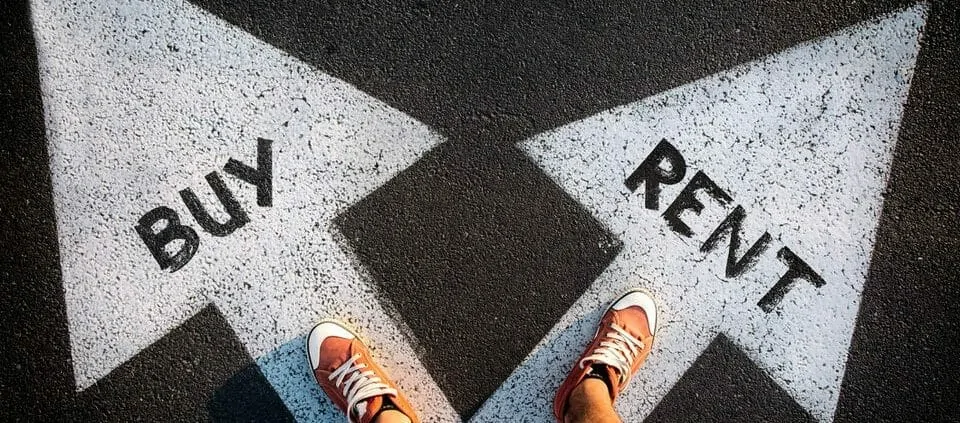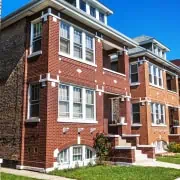Buy Or Rent In Chicago?
This updated article includes the latest information to help you answer the question “should I buy or rent in Chicago”. In recent years mortgage interest rates, inflation and supply issues have driven costs up for both renters and buyers. Let’s take a look at current market rates, then we’ll explore the pros and cons of buying vs. renting in Chicago.
Current Market Rates
For renters:
The bad news is rents keep going up…
Here are the average rent prices and year-over-year increases in the City of Chicago per Zumper as of April, 2024:
- 1 bedroom average Chicago rent is $2,140 up 18.9%
- 2 bedroom average Chicago rent is $2,700 up 24.4%
These are just the averages, the numbers vary in each Chicago neighborhood. Ask us about the rates in the neighborhoods you’re considering.
Moreover, supply of rentals remains tight, especially in neighborhoods like the West Loop.
Should you decide renting is better for you than buying, expect to compete to find the right place.
For buyers:
Here are the average sale prices and year-over-year increases in the City of Chicago per the Chicago MLS as of April, 2024:
- 1 bedroom or less average Chicago sale price is $237,598 up 3.9%
- 2 bedroom average Chicago sale price is $370,547 up 2.5%
Observations that may assist you:
- Inventory of all property types for sale is down 25% year-over-year
- Inventory of condos is down 23%
- That said, 1-2 BR condos in some areas of the city like the Loop are “on sale” due to local factors
- As we predicted in last year’s version of this article, rising mortgage rates (now 7+%) have reduced the number of qualified buyers in the market
- Many owners with +/- 3% mortgage rates have “golden handcuffs” and are on the sidelines waiting to step-up to larger homes
- Bidding wars are still happening for ideal properties in turn-key pristine condition, though we don’t see it as often as last year
But should I buy or rent in Chicago?
Our advice:
“If you plan on staying 3+ years, buying probably makes more sense than renting. With current mortgage rates hovering around 7%, we know it’s difficult but remember, you “date the rate and marry the property”. You can always refinance if a when rates decline. Moreover, should mortgage rates actually decline to the 5-6% range, pent-up demand will create a feeding frenzy with bidding wars for a limited inventory.
On May 10, 2024, the New York Times released their updated and far more robust buy/rent calculator. It’s an excellent resource should you want to take a deeper dive into all the elements that might help you determine if you should buy or rent.
Resources: Search All Current Chicago Listings or Contact Us for help with your decision, tips on getting pre-qualified and your search.
Next, let’s take a look at the traditional pros and cons of buying vs. renting.
Best Reasons To Buy In Chicago
As always, buy for freedom, to hedge inflation (suddenly more important!), as a vehicle to force savings, to build equity and for the potential tax benefits.
Let’s look at each of these reasons to buy vs. rent in Chicago:
For Freedom
The main reason many people want to buy a home is for the feeling of freedom it brings.
As a home owner you have total freedom to express yourself creatively and productively in your space.
The result for many is a higher quality of life.
For instance, home owners have the freedom of creative expression and choice. For example, you can transform an older kitchen into a modern hub of social activity for friends and family. You own it, you decide!
Of course, if it’s a condo, this freedom may be curtailed by the condo bylaws, rules and regulations.
As A Hedge Against Inflation
Normally, with inflation comes higher rent rates. If you’re a home owner with a fixed mortgage you basically are protected against inflation going forward.
Historically many Chicago renters have felt the pain of annual rent increases. And we are seeing this again in today’s market.
Alternatively, buy a home and you lock in a mortgage interest rate for 5, 7, 10, 15 or 30 years, but you can refinance should rates decline.
Plus, knowing what your monthly payment will be in the long haul provides a sense of peace that renters often don’t enjoy.
To Force Savings
Over the years, home ownership has been a really good investment for many Chicagoans.
Clearly, it’s not without substantial risk as we know from the 2008 real estate crash. But bubble aside, the long term savings value is evident.
Plus, home buyers buy on a huge margin, in some cases with just 3% to 5% down. That’s a deal not found in other investment venues like the stock market.
To Build Equity
When deciding whether to buy or rent in Chicago, building equity may be one of your primary reasons.
Over the past 75 years buying a home has been a great way to build personal wealth.
Each month a portion of your mortgage payment is applied toward paying down your loan principal.
So, assuming home prices appreciate, when you sell your home, you’ll receive the principal you paid in plus money from any market appreciation.
This sounds pretty good compared to paying rent, a 100% monthly expense. Money gone.
For The Tax Incentives
The tax incentives for many home buyers in Chicago are still pretty significant.
Those living in markets with high local property taxes and super expensive housing (think NYC and Silicon Valley) are not seeing the tax incentives they did prior to the federal tax reform.
However, mortgage interest and property taxes remain tax deductible for many Chicago home buyers. Rent however is generally not tax deductible.
In addition to annual tax deductions, home owners can often make money on the sale of their home and take profits tax free within certain limits. Talk with your tax accountant about your specific tax circumstances.
Resources for buyers:
Best Tips For First Time Home Buyers In Chicago
Buying A Chicago High-Rise Condo
Get Pre-approved For A Chicago Mortgage
Best Reasons To Rent In Chicago
Rent for career and financial flexibility, to save a down payment and to avoid repair bills, real estate taxes and real estate market risk.
Here are the best reasons to rent vs. buy in Chicago:
For The Flexibility
These days flexibility seems to matter more than ever. For many the best reason to rent is maintain career and / or financial flexibility.
You’ll want the flexibility that renting provides if you expect a job change, you get a promotion to a new market or meet that special someone who lives in Atlanta. (Note: if that happens check out our sister company Best Atlanta Properties!)
Consider your time horizon. If you can’t see beyond two years then you should probably rent. You’ll appreciate that flexibility when you want to make a change.
Or rent if you want the financial flexibility to invest your money somewhere besides a home. For example building a small business may be a better use of your capital at the moment.
To Save Up
Say you want to put 5, 10, 20% down on a home purchase but need to save more to get there. Then rent and save until you have the money needed. It this is the case you want to be sure it’s actually cheaper to rent than buy in Chicago. To answer that question right now, run the numbers.
For The Lower Expenses
Owning a home can be expensive at times. If you’d prefer not to pay for those things that go wrong then rent. For example, if you rent and the HVAC fails, of course the landlord pays the big bucks to replace it.
To Avoid Taxes
Let’s face it, real estate taxes in Downtown Chicago neighborhoods are really high. And at the moment it seems they will only go higher.
For example, a spacious 2 bed / 2 bath West Loop condo can come with real estate taxes of more than $10,000 a year. In the neighborhoods we serve we see property taxes ranging from $4.25 to $6.50 per square foot.
If you’d rather not be committed to pay those taxes, renting might be best.
To Reduce Market Risk
If you believe that in the next few years home prices will go down, you may want to rent a place to avoid market risk.
When renting you can manage risk by negotiation a fixed rent for a second or third year in advance.
Resources for renters:
How To Find A Rental In Chicago’s Competitive Rental Market
Explore The Latest Chicago Rentals
Conclusion: Should You Buy Or Rent In Chicago?
It’s our hope this discussion of the pros and cons of buying vs renting in Chicago has helped you determine the best course of action for your situation.
Further questions? Ask us, we’re here to help you buy or rent in Chicago!






 Best Chicago Properties, LLC
Best Chicago Properties, LLC Best Chicago Properties, LLC
Best Chicago Properties, LLC Best Chicago Properties, LLC
Best Chicago Properties, LLC
 Best Chicago Properties, LLC
Best Chicago Properties, LLC